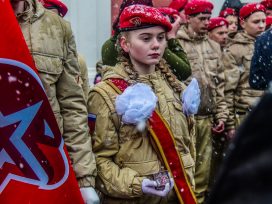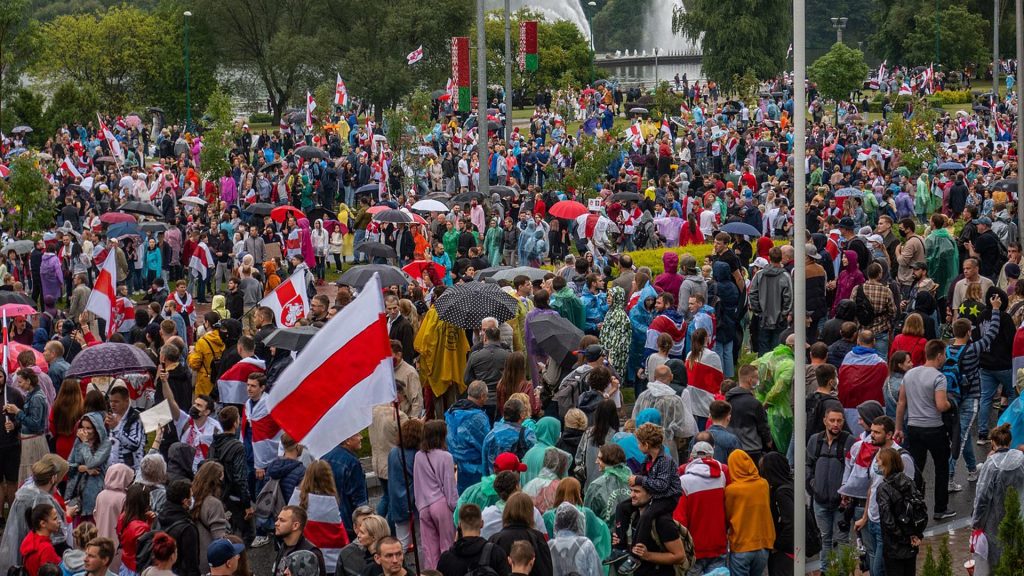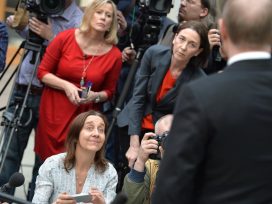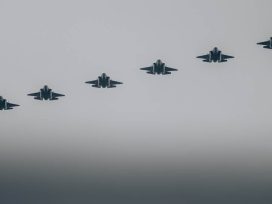Osteuropa: How would you describe what is happening in Belarus?
Lev Gudkov: We are seeing a crisis of the totalitarian regime that emerged in Belarus after the collapse of the totalitarian Soviet system. Regardless how the crisis ends, the authoritarian government will not continue in the form in which it has existed for the past 26 years. It has become obvious that the regime does not have the resources to maintain itself. Without the support of the imperial centre in Moscow, it is unsustainable.
Why have people been able to overcome their fear and cynicism?
There are two explanations, one psychological and the other economic. The economic explanation is that, since 2014, the business model of the Lukashenka regime has ceased to function. One reason for this is the low price of oil. With its two refineries for processing oil from Russia, Belarus is just as dependent on oil as its neighbour. The other reason is the conflict with Moscow. After the annexation of Crimea, Lukashenka tried to exploit the deterioration of relations between Russia and the West in order to extract subsidies from Moscow, discounts on oil and gas, and preferential treatment in numerous business matters. Otherwise, he threatened to move Belarus closer to the West.
However, Russia did not allow itself to be blackmailed, and instead cut concessions for Belarus in order to pressure the country into forming a union. Both factors have led to economic stagnation, which was felt particularly by the truck manufacturer MAZ, whose production has decreased by two-thirds in the past few years. The social situation has also worsened. Today, real incomes are still at the same level as they were in 2008.
And the psychological explanation?
What for people in western democracies seems the most natural thing in the world is, for people in totalitarian systems, nothing of the sort. Voting against a dictator requires enormous inner effort. It’s not just about overcoming one’s internalized fear of the police, of the KGB, or of losing one’s job. What is even more difficult is tolerating the emotional dissonance that arises if one wants to escape conformism, which acts like a form of collective capture. Breaking away produces a feeling of disloyalty. Orwell called it thought crime.
But whoever throws off this iron armour, whoever overcomes the feeling that there are no alternatives, suddenly regains their self-respect. The more people who succeed in doing this, the more the feeling of collective euphoria and absolute solidarity spreads. It’s hard to describe. People realize that they are not alone, that they have become a force that keeps on attracting others. The extraordinary mobilization that the opponents of Lukashenka have attained has had a snowball effect. Suddenly, fear has gone and with it the habit of powerlessness. Time has suddenly started moving again; eternal stasis has given way to hope for change, for a new life without tyranny and violence. Everyday cynicism and the deep-rooted, chronic feeling of humiliation have given way to a new sense of self-respect, together with a determination to defend it.
What image do people in Russia have of Belarus?
A very positive one. Belarus is said to be the country to which Russia is most favourably disposed. In the surveys carried out by the Levada Centre, Belarus always comes above China and Kazakhstan.
Why is that?
Russia and Belarus have many links. The border is open. Russia is Belarus’s most important trading partner and many Belarusians work in Russia. All Belarusians speak fluent Russian. Russians and Belarusians largely share the same culture, many of them even watch the same TV channels. As a result, Russian state propaganda is very influential in Belarus. All of that reduces the prejudices and reservations on both sides.
Are people in Russia in favour of unification?
No. They’re not particularly interested in absorbing Belarus into the Russian Federation. According to our surveys, only 13 per cent of the Russian population are in favour of unification. Most people think that relations should stay as they are.
How does this compare with the image Russians have of Ukraine?
Kremlin propaganda portrays the Ukraine as a foreign and hostile country. It persistently discredits the Ukrainians’ pursuit of democracy and their focus on the West. Until the annexation of Crimea, this was a hard job: relations were too close, the two countries had a shared culture, economic ties, and above all people had family connections. The Maidan Revolution and the annexation of Crimea changed everything. Aggressive state propaganda has succeeded in convincing many people in Russia that there had been a coup in Ukraine, and that radical nationalists had seized power: the so-called banderovci, fascists and enemies of Russia. The only course open to Russia, according to the propaganda, was to protect Russian-speaking Ukrainians from genocide.
Today the Ukraine has an extremely negative image in Russia. That would be unthinkable in the case of Belarus. Until recently, Lukashenka was continually emphasizing the country’s common interests with Russia and his loyalty to Soviet values. His outbursts against Moscow after the Kremlin’s failed attempt to merge Russia and Belarus into a single state got little coverage in Russia.
Are there similarities between events in Belarus and the upheavals in Armenia, Georgia and the Ukraine?
The situation in Belarus is completely different. Armenia and Georgia had armed conflicts with neighbours or separatists. Armenia has been at war with Azerbaijan for 30 years over Nagorno-Karabakh. Georgia suffered defeat in the war against Abkhaz separatists in the early 1990s and in the war against Russia in 2008. That left marks.
What sort of marks?
A big role is played by negative consolidation, by which I mean internal social integration achieved by ostracizing external enemies. The wars have had an impact on society and domestic policy, but also on foreign policy towards Russia, the West and Turkey. Belarus doesn’t have any of that. Its political culture is much closer Russia’s. Soviet thinking persists, including prejudices against the West.
What is Moscow’s attitude towards the protests in Belarus?
There have been various phases. The Putin leadership was obviously surprised by developments and at first didn’t have a clear position. The Kremlin took a reserved, even contradictory approach to the election result. Putin congratulated Lukashenka, but his tone was cool and formal. Politicians who usually act as nationalist agitators took a surprisingly negative tone. Vladimir Zhirinovsky talked of vote-rigging and Konstantin Zatulin announced that Lukashenka had lost the election. Aleksey Pushkov, the chair of the Duma’s foreign affairs committee, who normally whips up anti-western feeling, took a similar view. Even Foreign Affairs spokeswoman Maria Zakharova effectively conceded Lukashenka’s defeat. He had made many mistakes, she said, and bore responsibility for the protests. Foreign minister Sergey Lavrov later corrected this line. Since there had been no foreign independent observers during the election, he said, there was no conclusive evidence for Lukashenka’s defeat.
How do you interpret these contradictory signals?
The Kremlin did not want to support Lukashenka openly. Initially, it said that there were no plans to deploy troops to Belarus because there were no grounds to do so under the Collective Security Treaty. At the same time, high-ranking politicians and Putin’s spokesman Dmitry Peskov were warning against any ‘interference by foreign external powers in the internal problems of a federate state’. Only Gennady Zyuganov, leader of the Communist Party, came to the defence of Lukshenka, warning that the actions of the opposition could lead to the country’s disintegration.
And Putin?
Putin made no comment. And as long as Putin remains silent, there is no clear position. So the siloviki didn’t say anything, either. During this phase, something approaching pluralism reigned in the media. Some television stations were talking about the danger of a ‘new Maidan’ and western provocation. This ‘West’ alternated between Poland, Lithuania and the USA. However, other stations broadcasted sympathetic reports on the protests.
During this phase it seemed possible that if the Belarusian opposition could agree terms that suited Moscow, Putin might consent to Lukashenka’s removal. The opposition explicitly declared that it wanted to continue the country’s close partnership with Russia and maintain economic links. In contrast with the Euro-Maidan, there were no anti-Russian slogans at the Minsk demonstrations.
This phase is over.
Yes. The Kremlin is now helping Lukashenka to ‘restore order’. Moscow has despatched secret service agents to Belarus as ‘consultants’, along with television journalists and technicians to replace their striking Belarusian counterparts. The Kremlin is now backing Lukashenka’s suppression of the demonstrations. This is also reflected in the Russian state media, which has launched a massive campaign to discredit the Belarusian opposition, accusing it of wanting to destroy the alliance between Russia and Belarus.
Putin declared that Russia would establish a ‘reserve force from members of the security services’ in order to prevent ‘armed robbery’ and to combat ‘extremist forces with political slogans’ sent by western intelligence agencies. He indirectly labelled the Coordination Council a tool of ‘foreign powers’. After the Belarusian Security Council decided to quash the protests in Belarus on 28 August, Putin proclaimed that ‘the presidential election in Belarus is over’.
The Belarusian opposition doesn’t see it like that. Tens of thousands of people continue to take to the streets.
The only way the opposition can force the regime to change course is by mobilizing even more people. This would have to involve a general strike across the whole of industry and transport sector. Employees of state television and radio would have to refuse to work and the army and the police would have to declare themselves neutral.
Is there a risk that violence will escalate?
That’s up to those in power. Consider the putsch in Moscow, 30 years ago in August 1991. Back then, the army, the KGB and the police refused to comply with the directives of the Emergency Committee. Their formal justification was that it was not clear who the legitimate ruler of Russia was. However, the ‘Tblisi syndrome’ also played a big part. The army’s reputation had been severely damaged after the suppression of peaceful protests in 1989 and 1990, first in Tblisi, then in Baku, Vilnius and Riga. The generals did not want to take responsibility for further violence against the civilian population.
There is no sign that the power apparatus in Belarus has been paralysed in a such a way. If Lukashenka were to decide to shoot at the demonstrators, that would inevitably happen at some point. But it can take a long time for cracks to appear. And the opposition doesn’t have time. People’s willingness to take to the streets is subsiding.
The law of the excluded middle?
A round table to prepare for free and fair elections would have been one way out of the impasse. But that’s now out of the question. Lukashenka is sticking to his line: ‘new elections over my dead body!’ He wants to wear down the movement by digging in and carrying out further repressions. He’s waiting for his opponents to show signs of exhaustion so that he can set the state security bloodhounds on them. He wants revenge. Anyone who has taken part in protests or strikes will be subject to harsh penalties.
Do you predict a Belarusian variant of Tiananmen, with tanks crushing peaceful demonstrators?
Hopefully it won’t come to that. The regime in Minsk prefers targeted repressions: members of the Coordination Council and the leaders of strikes are being taken out of action through prison sentences. All other visible members of the protest movement will be blacklisted, they will lose their jobs.
After a short time when it looked as if the regime might crumble, Lukashenka seems to have got the upper hand again. It’s possible that he will try to hasten the course of events by declaring a state of emergency, ordering a lockdown and closing the borders. He’s already prepared the ideological ground for this by claiming that Belarus is being threatened from outside and that a conspiracy is underway. There’s reason to fear that he’ll be able to see this through, because he has the administration, the army and the forces of the KGB and the Ministry of Internal Affairs, behind him.
Neither can it be ruled out that the regime could stage an incident on the border, in order – as happened in Poland in 1980 – to impose martial law and begin suppressing the movement completely. This kind of ‘incident’ would provide the justification for troops to be sent from Russia to ‘normalize’ the situation. But that would spell the end of the Lukashenka regime’s independence.
What options are left to the opposition?
It is extremely unlikely that the opposition will be able to achieve its aims through purely non-violent and constitutional methods, especially as the country’s judiciary and all other state institutions are completely under the control of the dictator. The opposition lacks organization. Initially, its horizontal mobilization structures were an advantage, but such an amorphous, fluid community is difficult to sustain over a longer period. The momentum of a movement collapses if there is no organization to plan and determine what the next steps will be, and in what order problems should be addressed.
Are the protests in Belarus influencing public opinion in Russia?
Events are being closely monitored. They are seen as a prototype for potential developments in Russia. The Kremlin media are now crying that a coup is being orchestrated from abroad, as supposedly happened in Georgia, and twice in Ukraine. A few liberal commentators are linking the protests in Belarus with those in Khabarovsk, where people have been demonstrating for over two months against the detention of the local governor. But the Kremlin propaganda machine has succeeded in convincing many people that the protests against the regime in Belarus represent a threat.
How?
The results of a survey the Levada Center carried out between 20 and 26 August show that Russian society has a predominantly negative reaction to the events in Belarus. Fear of destabilization is reflected in a significant increase in support for Putin and other representatives of the Moscow leadership compared with four weeks previously. A large number of respondents acknowledge – reluctantly – that people are protesting in Belarus because they have had enough of Lukashenka, because the standard of living in Belarus has declined, and because they are scandalised by vote rigging and by the violence of the police. Fifty-nine per cent of respondents mentioned one of these factors. And yet 39 per cent believe the protests were provoked by the West or the Belarusian opposition. Whether it’s out of a desire to conform, fear of change or for some other reason, 57 per cent of respondents hope that Lukashenka will remain president, and only 17 percent say they support Tsikhanouskaya. The rest say that they are not following events or that the election result is of no importance to them. Forty-eight per cent think that by and large the elections were run ‘properly’, while 36 percent believe that the official results were falsified.
There is no doubt that attitudes in Russia are strongly influenced by state propaganda, which frightens them with narratives about large-scale unrest, a ‘new Maidan’ and hostile acts on the part of the West. It is above all older people with basic educational qualifications who are employed by the state who are susceptible to such narratives, that is to say the Putin regime’s social base.
Interview conducted by Manfred Sapper, 30.8.2020







